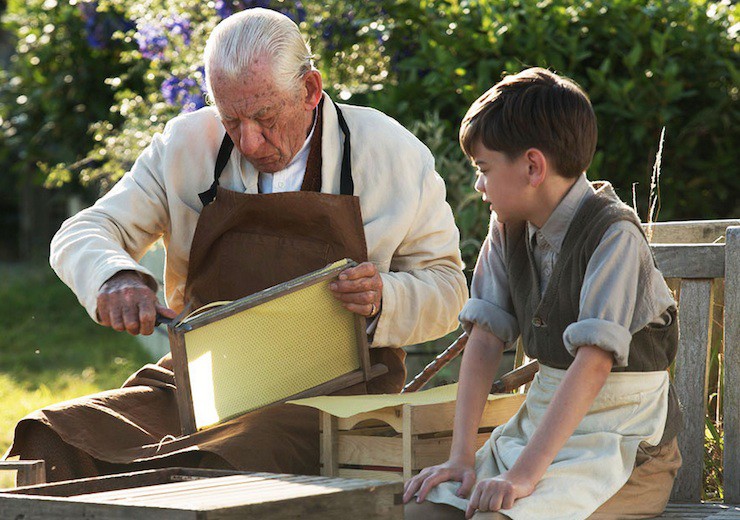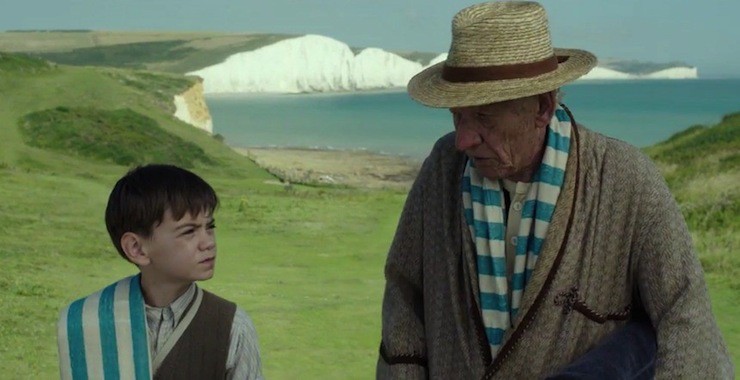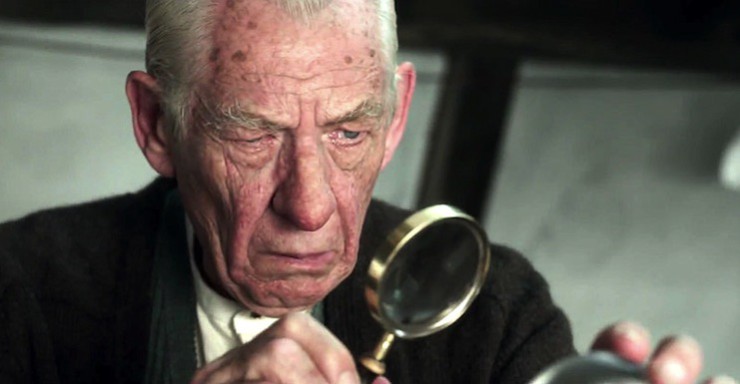Early on in Mr. Holmes, Sir Ian McKellen’s 92-year-old version of the aging detective says “I was real, once.” This is funny, because if you know nothing about Sherlock Holmes you might think you are watching a biopic about THE REAL MAN BEHIND THE MYSTERY instead of a work of fiction based on a book, which in turn is based on other books. Bill Condon’s new film Mr. Holmes (adapted from Mitch Cullin’s 2005 novel A Slight Trick of the Mind) imagines a “real” version of Sherlock Holmes who is more contemplative and nuanced than perhaps any incarnation before.
But is nuanced and contemplative what we want of Mr. Sherlock Holmes? Because when you eliminate the hyperbole of adventure, what’s left for the world’s greatest detective?
Light spoilers for Mr. Holmes.
Like the novel from which its adapted, Mr. Holmes follows three storylines which all converge more or less around one central theme: Sherlock Holmes is getting old and is having a tough time remembering the particulars of his “last” case. To this end, Holmes is consuming anything he can to battle senility: specifically eating royal jelly produced by his bees, and also a mysterious Japanese substance called “prickly ash.” The pay-off of the film is set up early on: can Sherlock Holmes remember what happened? What made him leave London, give up being a detective, and start becoming obsessed with taking care of bees?

If you’re someone who is as obsessed with Sherlock Holmes as I am, then you’ll know the aforementioned bees and bee-keeping pop up in only three of the original Conan Doyle short stories: “His Last Bow,” “The Blanched Solider,” and “The Lion’s Mane,” the last of which is the only story in which Holmes is depicted living in Sussex actually doing the bee-keeping. “The Lion’s Mane” is odd mostly because it is a story told by Sherlock Holmes himself, and in it, purports to be an attempt at writing a story which “corrects” some of the over-the-top fantasies perpetrated by Watson.
As a short story, “The Lion’s Mane” is easily one of the worst Doyle Sherlock Holmes adventures precisely because it lacks the narrative distance/tensions which the Watson frame brilliantly provides. Luckily, A Slight Trick of the Mind doesn’t suffer from this problem because it’s all-together a different beast than an original Holmes story; instead, it tries to make a more legit and realistic version of why Holmes might want to write his own story—a kind of corrective and more introspective version of “The Lion’s Mane.” Don’t get me wrong, you miss Watson in A Slight Trick of the Mind, too, but it’s not a huge problem.
Then what is Mr. Holmes? In many ways, it’s like a chimera of the bees and wasps depicted inside of the film—sometimes it wants to go on the offensive with complicated mystery-plots (wasps), and other times it wants to sort of chill out and make honey (bees). The honey-sweet side of Sherlock Holmes is on full display here not only as a sympathetic old man losing his ability to remember anything, but also in flash backs in which a 60-ish-year-old Holmes is working on his final case in London. These scenes and McKellen’s performance in them are easily some of the most satisfying, at least to a fan who wants to see McKellen doing a version of Sherlock Holmes who still has his shit together. And though McKellen is totally brilliant in the role and you buy him 100% as Sherlock Holmes, there’s still probably not enough Holmsesian money-shots to satisfying a fan of the stories. At one point young Roger (Milo Parker) petulantly asks Holmes to “do the thing,” by which he means quickly deduce a bunch of facts about someone through seemingly casual observation. A big fan of Sherlock Holmes in the audience might feel similarly: do the thing, already!

Conversely, if you’re someone who doesn’t care about the Sherlock Holmes stuff, there might not be enough “regular movie stuff” in this film for you to figure out what’s really at stake. How many mysteries are we dealing with here? Does the housekeeper (Laura Linney) really have to be so one-note? Why are there so many bees again? True, the relationship between Holmes and Roger is totally heartwarming, and the tragic story as to why Sherlock Holmes really retired is sad enough to make you choke up a little. But I worry that, if you knew nothing about Holmes’ isolation or general anti-social tendencies, you might not understand why this one incident was enough of a tragedy to make him give it all up. Both Holmes fans and casual audience members might be confused: why did Holmes really give up on himself?

The almost total absence of John Watson is probably part of what makes both “The Lion’s Mane,” and by extension Mr. Holmes, so odd. In The Hound of the Baskervilles Holmes says of Watson: “It may be that you are not yourself luminous, but you are a conductor of light.” Watson alone can’t create the adventures without Sherlock Holmes, but Sherlock Holmes without Watson becomes a contemplative, confused, and confounding individual. I think in film adaptations, the audience needs a Watson too. And though this movie depicts Holmes as a sadder, more regretful person than perhaps he’s ever been before, the character is oddly more distant to us than when Watson is telling the story. True, the film effectively conveys the simple idea that perhaps the only way people can exist is to be “alone to together,” but without a steadier, perhaps more contrived character like Watson, some of the light isn’t shined adequately on the colony of bees inside of Holmes’s depressed head.
Still, McKellen is wonderful to watch and a few of his speeches and/or Holmesian witticisms certainly make him a worthy addition to the conga line of all the actors who have played the role before him. While not a classic, Mr. Holmes doesn’t do anything to harm the rich and exciting world of Sherlock Holmes, and does add to it a mite. But it might not play enough in that world as much as it could have. Like a bee hovering around a flower, Mr. Holmes dances pleasantly around our heads, buzzing close enough to us to excite us occasionally, before flying away all together.
Ryan Britt is the author of Luke Skywalker Can’t Read and Other Geeky Truths out this November from Plume(Penguin) Books.










